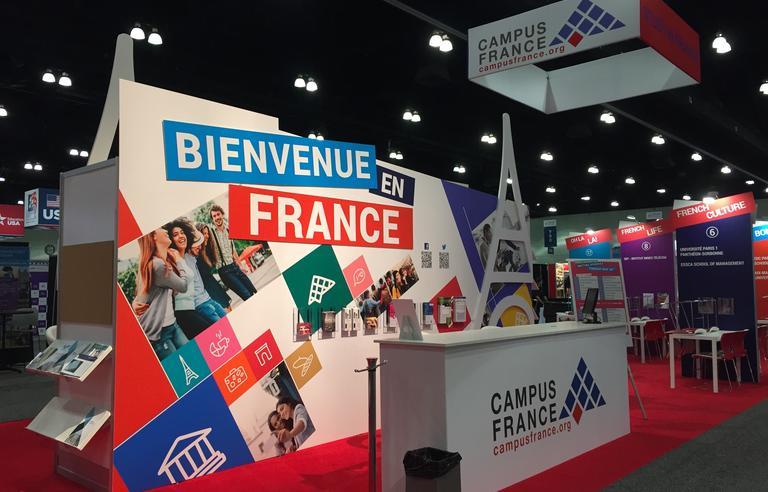TUITION FEES IN FRANCE

Because the French government subsidizes higher education, its cost for students is relatively low.
On 19 November 2018, Prime Minister Edouard Philippe launched the "Choose France/ Bienvenue en France" national plan. The government’s goal is to make France more attractive to international students and to increase the visibility of French Higher education system abroad.
To inform international students of the new regulations, which will soon be published in the Journal Officiel, information on Campus France website takes into account the Prime Minister’s announcement.
TUITION RATES IN PUBLIC INSTITUTIONS
Choosing to study in France means gaining access to high-quality programmes designed for a wide range of student interests. Tuition rates are low in public Higher education institutions because the French government subsidizes higher education. The true cost of education is the same as it is elsewhere in the world—around €10,000 a year. The difference is that in France the government assumes a large share of that cost.
Tuition rates for academic year 2019/20
For European students (nationals of a member country of the European Union, the European Economic Area, Andorra or Switzerland)
The French government will continue to pay most of the cost of your degree programme in a public institution of higher education. Tuition charges will be similar to those in academic year 2018/2019.
- €170 per year at the licence (bachelor) level
- €243 per year at the master level
- €601 per year in a school of engineering*
- €380 per year at the doctoral level
* Except for programmes begun after 1 September 2018 at the Ecole Centrale in Lille, Lyon, Marseille, and Nantes, and at the Ecole des Mines in Nancy, where the annual tuition will be €2,500.
Keep in mind…
- The schools of engineering operated by the Ministry of Defense (ENSTA Paris Tech, ISAE, Polytechnique), the Ministry of the Economy (Mines Paris Tech, the schools of the Institut Mines Telecom), and the Ministry of Agriculture (AgroParisTech, Montpellier Sup Agro) have different tuition charges. Check the rates on the websites of the schools that interest you.
- You may also be subject to examination fees when applying to schools of engineering.
For students from other nations
If you were already enrolled in a public institution in 2018/2019, your tuition payment will not change. As before, the French government will assume most of the cost of your education until you complete your degree programme.
However, you are subject to new differentiated tuition rates if you arrive in France at the beginning of the 2019 academic year and enroll in degree at Bachelor or Master level. Under this circumstance, France will continue to pay two-thirds of the real cost of your education. Your tuition for 2019/2020 will be as follows:
- €2,770 per year at the licence (bachelor) level
- €3,770 per year at the master level
If you enroll in a degree at Doctorate level at the beginning of the 2019 academic year, the French government will continue to assume most of the cost of your education until you complete your degree programme. Your tuition for 2019/2020 will be €380. Non-EU doctoral students are not subject to new differentiated tuition rates.

WHICH TUITION FEES ACCORDING TO YOUR SITUATION?
Tuition fees similar to those of 2018/2019 and equivalent to those of French students for…
- Students with the nationality of countries in the European Union, the European Economic Area or Switzerland;
- Students with the nationality of a country that has signed an agreement with France providing for the payment of enrolment fees under the same conditions as French students. This is the case with Andorra and Canada (for students resident in Quebec);
- Non-EU students...
- ...already registered in a public higher education establishment in 2018/2019, at all levels (Bachelor's's, Master's, Doctorate);
- ...who are due to arrive in 2019/2020 and will be starting a Doctorate;
- ...registered in 2018/2019 in a French as a foreign language course (FLE – Français Langue Etrangère) before starting a Bachelor's, Master's or Doctorate and who will begin their studies in 2019/2020;
- ...who live in France with resident status or with a carte de séjour (residence permit) stating "vie privée et familiale" (private and family life);
- ...who have refugee status or who benefit from subsidiary protection.
No tuition fees, whether differentiated or not for…
- Students who come to study in France as part of a partnership agreement between universities that provides for total exemption from enrolment fees (like the Erasmus+ exchange programme in particular);
- Students who have been awarded a French government grant (BGF) ;
- Students who have been awarded a grant from their host institution, providing for total exemption from enrolment fees.
Partial or total exemption for…
Non-EU students who have been granted full or partial exemption from tuition fees by their host institution in France or by the French embassy in their home country.
The government's plan to attract international students gives embassies and institutions the opportunity to exempt a very high number of non-EU students from payment of differentiated tuition fees : 14,000 exemptions will be granted by embassies and institutions may exempt up to 10% of the total number of students who will enrol at the start of the 2019 academic year.
Differentiated tuition fees for…
Non-EU students not in any of the situations listed above :
- arriving in France for the 2019/2020 academic year and enrolling in a degree programme at Bachelor or Master Level ;
- enrolling in a public Higher education institution overseen by the Ministry of Higher Education (for example, one of France’s universities) ;
Have we answered all your questions? If not, we invite you to consult our FAQ.
























